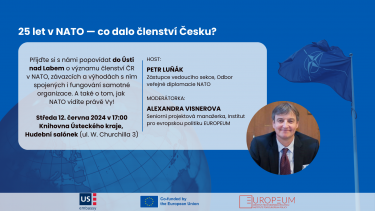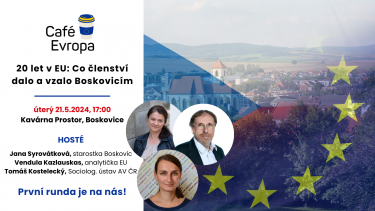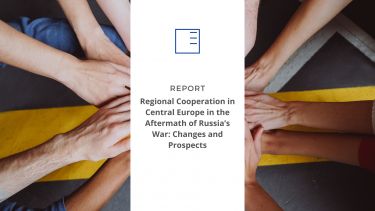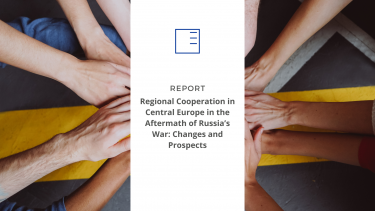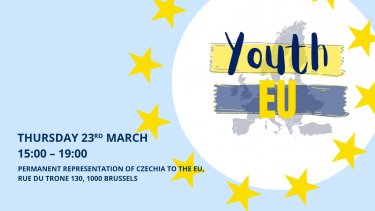Debate: 25 years in NATO - what has membership given to the Czech Republic?
We invite you to the second regional debate within the 25th anniversary of the Czech Republic's accession to NATO! Membership has brought benefits to the Czech Republic, but it also comes with a number of obligations. What is the importance of this alliance for us? And what do you think about NATO? Come to Ústí nad Labem to discuss these and other questions.
Show more
Café Evropa | 20 years in the EU: what has membership given and taken away from Boskovice?
Come and debate at the next Café Evropa regional debate series! This time we will be in Boskovice - how do you perceive 20 years in the EU? What has the EU given and taken away from you? Have European subsidies helped the development of the town? Are you worried about what the migration pact will bring? We want to hear from you!
Show moreReport | Regional Cooperation in Central Europe in the Aftermath of Russia’s War: Changes and Prospects
On April 18th, EUROPEUM’s Brussels Office in partnership with PISM Brussels Office under the Think Visegrad platform hosted a discussion titled “Regional Cooperation in Central Europe in the Aftermath of Russia’s War: Changes and Prospects”. This event was attended by 15 experts from think tanks and representatives of EU institutions.
Show moreReport | Regional Cooperation in Central Europe in the Aftermath of Russia’s War: Changes and Prospects
Dne 18. dubna 2024 uspořádala bruselská kancelář Institutu EUROPEUM ve spolupráci s bruselskou kanceláří Polského institutu mezinárodních vztahů (PISM) v rámci platformy Think Visegrad diskusi s názvem "Regionální spolupráce ve střední Evropě po válce s Ruskem: změny a vyhlídky". Této akce se zúčastnilo 15 odborníků z think tanků a zástupců institucí EU.
Show moreRTVS | Summit of V4 Prime Ministers in Prague
Czech Prime Minister Petr Fiala and Polish Prime Minister Donald Tusk met separately ahead of the Visegrad Group summit in Prague, where the main points of discussion were the war in Ukraine and energy security. Vít Havelka, an analyst at EUROPEUM Institute, commented on the position of the Hungarian or Slovak Prime Minister and the overall direction of the Visegrad Group for Slovakian television RTVS.
Show more
REPORT: The Round Table Electromobility And Work Opportunities: What Changes Await Us?
For the second time, experts on employment in the automotive industry and its transformation met, this time at the regional level of the Moravian-Silesian Region. The topic of labour changes in connection with decarbonisation and electromobility was discussed by representatives of automobile companies, trade unions, employers' associations, regional and state administration. The round table was organized in cooperation with Charles University, CELSI Institute, and Hyundai Nošovice. The report was written and the debate was moderated by researcher Rebeka Hengalová.
Show more PDFBLOG | How can the EU boost the implementation of the Franco-German Proposal? A turning point for Kosovo-Serbia normalisation process
Serbia's refusal to recognise Kosovo, which unilaterally declared independence in 2008, is at the root of many problems within the region of Western Balkan. It hinders both countries’ EU membership paths, creates destabilisation in the Balkans, as visible in the recent unrest in northern Kosovo, and hinders regional economic cooperation. Writes our intern from our Brussel's office Costanza Celoria.
Show moreDiscussing Ukraine in V4 mainstream media: The future vis-à-vis European integration
The project assesses the production, distribution and consumption of news on Ukraine’s future vis-a-vis European integration by the V4 mainstream media. The aim is to designate both dominant and marginalized narratives, while also analyzing their impact via focus groups. The findings will be presented to stakeholders in order to improve reporting and increase the audiences’ access to information.
Show more PNG
INVITATION | YouthEU: Challenging Euroscepticism Through Educating and Empowering Youth as European Citizens
We would like to invite you to a YouthEU conference on "Challenging Euroscepticism Through Educating and Empowering Youth as European Citizens". The conference will take place on Thursday 23rd of March at 15:00 at the Permanent Representation of Czechia to the EU in Brussels.
Show moreNational Convention on the EU | Recommendation: Formats of regional cooperation from the perspective of the Czech Republic
Our senior research fellow Jana Juzová and associate research fellow Zuzana Kasáková prepared a recommendation resulting from the round table discussion of the National Convention on the EU held on January 20, 2023 on the topic "Formats of regional cooperation from the perspective of the Czech Republic". The Convention produced recommendations based on the answers to the following questions: What position should the Visegrad Group have in Czech foreign policy? How should the Czech Republic approach other formats of regional cooperation in Central Europe? How should the Czech Republic use its involvement in European territorial cooperation?
Show more PDF
Staroměstské náměstí 4/1
Prague 1 - Staré Město
110 00
tel.: +420 212 246 552
email: europeum@europeum.org
https://www.europeum.org
